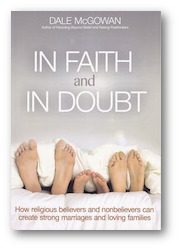| By Dale McGowan |
There’s a Southern Baptist church in Fort Worth, Texas that holds the Letter of Baptism for my wife Becca. After mostly growing up in the denomination, she was willingly baptized as an adult in 1990, the year before our wedding. I was by her side.
She was not a Mainline Protestant when we married — by affiliation, she was a Protestant Evangelical. If she ascribed to every piece of the denomination’s creed, the Baptist Faith and Message, we could still easily have been friends, but I doubt we would have dated, much less married. She agreed with several items in the list, but the Baptist Faith and Message includes a few important doctrines that I was pretty sure Becca wouldn’t ever have endorsed, any more than I’d endorse every Dawkins tweet.
I once printed out the BF&M and asked Becca which of its positions she remembered holding true when we were first married and which she would have rejected.
She believed there is only one God and that he is perfect, all-powerful, and all-knowing. But she never believed that man brought sin into the human race by disobedience, nor that “as soon as [people] are capable of moral action, they become transgressors and are under condemnation.”
She believed that Christ was the son of God, but not that he was born of a virgin, nor that salvation is available only through him.
She did not agree that “all Scripture is totally true and trustworthy.”
She did believe that baptism is “the believer’s death to sin, the burial of the old life, and the resurrection to walk in newness of life in Christ Jesus,” as well as a testimony to “faith in the final resurrection of the dead.”
But she didn’t believe it is “the duty and privilege of every follower of Christ” to evangelize others to the faith.
She agreed that “Christians should oppose racism, every form of greed, selfishness, and vice,” “work to provide for the orphaned, the needy, the abused, the aged, the helpless, and the sick,” and “do all in their power to put an end to war.” But she did not agree that homosexuality is a form of “sexual immorality,” that Christians should “speak on behalf of the unborn,” nor that the strict definition of marriage should be “the uniting of one man and one woman.”
One of the statements of the Baptist Faith and Message that surprises outsiders (and insiders, come to that) is clear support for church-state separation. “Church and state should be separate,” it says, and “the state has no right to impose penalties for religious opinions of any kind.” She agreed.
As for marriage and parenting, she had a somewhat more conservative approach than I did, but she never believed that it was her place to “submit herself graciously to the servant leadership of her husband even as the church willingly submits to the headship of Christ,” nor that she had “the God-given responsibility to respect her husband and to serve as his helper in managing the household and nurturing the next generation.”
You might think that this indicates her religious identity wasn’t important to her, but that’s not true. Before we were married, she made sure I would not ask her to stop attending church, and she went every week. She prayed and read a daily devotional. Her religious identity was a big part of who she was. But the contents of her cafeteria tray identified her as a representative of the Evangelical Left, who affirm the theological basics (atonement, incarnation, resurrection) but reject the conservative social platform of the evangelical churches.
So aside from the God-and-Jesus theological frame, my own tray of humanist values and beliefs wasn’t all that different from Becca’s.
Sure, you might say, but the remaining differences include some pretty big stuff, like God and Jesus, and what happens when we die. Doesn’t get much bigger than that.
And there’s the question at the heart of the religious/nonreligious marriage: Even if there is some common ground, aren’t the remaining differences just too big for the relationship to work? How could any question be bigger than God’s existence, how the universe will end, or what happens when we die?
Yes, those are big questions. But “big” and “important” aren’t always the same. This isn’t about the way I see the world — it’s about whether I can be in a loving, enduring relationship with someone who sees it differently. And when the question is framed in that way, the “big” theological questions are actually smaller and less important than the social values questions. On those, this atheist and his evangelical wife had a solid match for 13 years. And when she decided to clear the theological beliefs off her tray ten years ago, most of her values stayed put.
 Excerpt from In Faith and in Doubt: How Religious Believers and Nonbelievers Can Create Strong Marriages and Loving Families by Dale McGowan (AMACOM, 2014)
Excerpt from In Faith and in Doubt: How Religious Believers and Nonbelievers Can Create Strong Marriages and Loving Families by Dale McGowan (AMACOM, 2014)
DALE McGOWAN has written and edited 11 books, mostly focused on the nonreligious life. He was Harvard Humanist of the Year in 2008 and founded the humanist charity Foundation Beyond Belief in 2010. Dale is now content development editor and Atheist Channel manager for Patheos. He lives in Atlanta.











